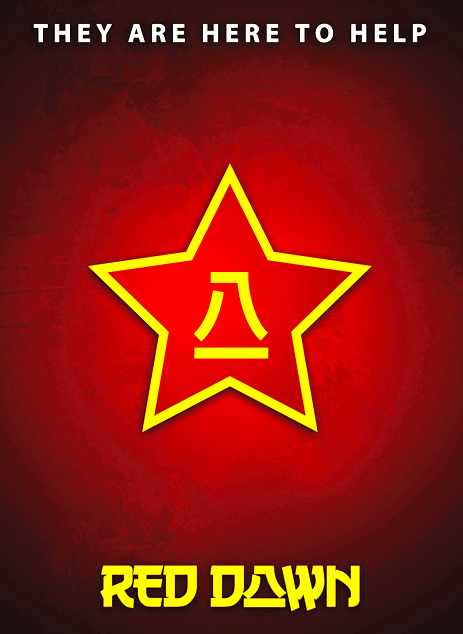
By Jason Apuzzo. Last August, Libertas was the first and only media outlet invited to see MGM’s new version of Red Dawn, a remake of the original 1984 film written and directed by John Milius. We were invited to see the film by MGM executives due to our ongoing coverage here at Libertas of pro-freedom films – and of our coverage of the many recent films specifically dealing with the subject of communism (Salt, Mao’s Last Dancer, Farewell, Peter Weir’s recent The Way Back). Red Dawn screenwriter Carl Ellsworth was in attendance at our screening.
We postponed commenting on Red Dawn until this time due to the complex and delicate situation at MGM, and also due to the fact that the film as yet has no release date. MGM is under new management, however, and recently the LA Times broke the story that the film – which features the communist Chinese invading the mainland U.S. – is currently being re-edited and digitally altered by MGM’s new management team in order to make North Korea into the primary invading force. References to the Chinese military are, according to the LA Times, being minimized wherever possible. The film has apparently become a political hot potato, with MGM looking to sell the film – or perhaps not release it at all.
We had been aware since last August that this was a possibility, in so far as the Chinese market represents a highly lucrative one to American film distributors – and that China would likely penalize any company distributing this new Red Dawn. It now appears that the fears expressed to us at the time by several MGM executives are becoming a reality, and that the film is, in effect, being politically censored due to pressures coming from potential distributors.
Needless to say, we find this kind of political re-editing of a film appalling – as well as unprecedented. In the case of Red Dawn, it’s also perversely ironic, in so far as the basic premise of the film involves the Chinese invading American in order to ‘collect’ on an economic debt America owes to them – a debt that in the real world, as it turns out, China will now be ‘collecting’ by MGM’s film simply being re-edited.
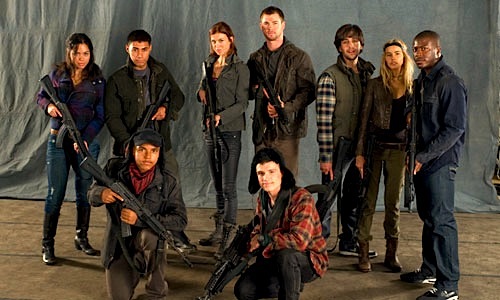
As a further note, there is a certain racist crudeness in equating Chinese with Koreans (i.e., ‘Asians all the look the same’) of which MGM seems unmindful.
Here at Libertas we are committed to positively promoting films that celebrate freedom, democracy, and the dignity of the individual. Of late, for example, we’ve promoted a whole range of dissident, ‘D-Generation’ Chinese documentaries such as Disorder, Petition and Crime and Punishment that depict the full brutality and authoritarianism of China’s current regime.
We had hoped and intended to promote Red Dawn in the same light, because the original, ‘uncensored’ cut of the film we saw in August was one we liked – and we suspect American audiences would’ve liked it, as well. (Chinese dissidents would’ve loved it – watching it on pirated copies.) It was a rousing and patriotic film that in some respects resembled Battle: Los Angeles, currently in theaters, in terms of depicting a plucky and outnumbered group of Americans (teenagers, in this case) gamely taking on a vastly superior and oppressive invading force.
Those basic elements will no doubt remain in the final version, but Chinese communist militarism is now apparently going to be downplayed or whitewashed in favor North Korean militarism – even though, as is widely acknowledged, the communist Chinese government is itself the chief enabler of the North Korean regime.
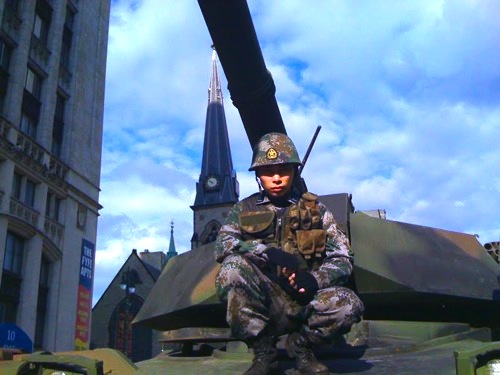
So in the interest of informing the public, we’ve decided to disclose what we saw in the original, ‘uncensored’ cut of MGM’s new Red Dawn – the version that featured the Communist Chinese as the villains.
—
The ‘uncensored’ version we saw of Red Dawn was a stirring, highly patriotic ode to America and its freedoms – the kind of film that until recently I didn’t think Hollywood could make any more.
The film opens with a series of title cards explaining how the United States has over-extended itself both militarily and financially, and put itself in deep economic debt. The upshot is that the Communist Chinese, eying America and its financial weakness, are ready to collect on this debt. The film’s brief, explanatory setup is chilling and effective, given current events.
We then cut to a high school football game in a suburb of Spokane, Washington where we first get to see the ‘Wolverines’ in action (as in the original John Milius film, the ‘Wolverines’ here are the mascot of the local high school). Whereas most films featuring high school football never really capture the speed, violence and chaos of the game, this opening sequence really depicts all that nicely and feels realistic. It’s a small point, but it’s important – because it sets the mood for the intense guerilla action to come.
The film’s two central characters are introduced in this sequence: Matt Eckert, played by Josh Peck, and his brother Jed Eckert, played by Thor‘s Chris Hemsworth. Jed is an Iraq War vet, recently back from deployment; he’s shown up unexpectedly to watch his younger brother quarterback the Wolverines. The two brothers have an easy rapport, but there’s still some underlying tension there, as there usually is among brothers. Is it just that Matt wears his hair too long, and seems a little on the soft side in comparison to Jed? We don’t know yet, but we learn more about the true source of that tension as the story unfolds.
After the game, the brothers go out with their buddies to do what high school guys usually do after football games: get beers and girls. As this plays out, we get a slightly better feel for Chris Hemsworth’s Jed – he’s brooding and intense, and has a difficult time unwinding. Recently back from fighting overseas, it’s not so easy for him to fall into the carefree world of high school partying anymore. He’s seen too much.
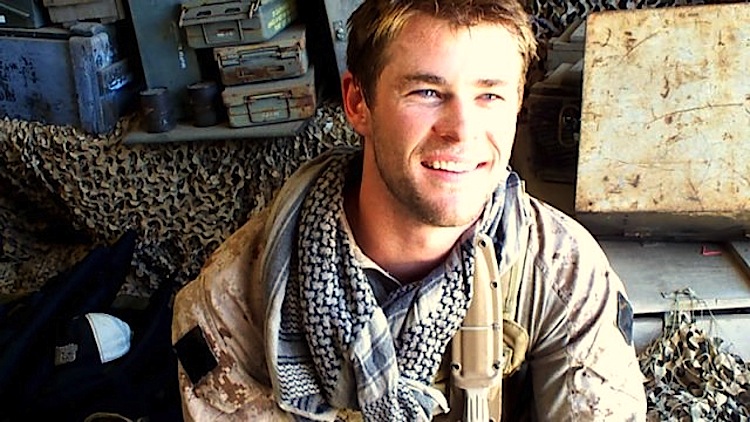
Red Dawn paints small town life here with swift, clean strokes. It took only a few minutes for me to feel like I knew these guys and what makes them tick. Their world, basically, is a world of trucks, chicks, strong personal loyalties and vague apprehensions for their future – the kind of world Springsteen has made a career singing about.
Their world is about to change, however, and abruptly. With no warning other than an ominous rumbling noise, and their house shaking, the Eckert boys and their compatriots wake up one morning to see Chinese paratroopers dropping out of the sky in a massive, thunderous air assault. It’s a genuinely frightening, gut-wrenching sight as transport planes disgorge an endless number of Chinese soldiers into the skies above this otherwise quaint town. At one point, an American missile hits one of the planes – and the plane’s fiery wreckage crashes right into one of the houses. Reality is suddenly hitting these teenagers in a big, 9/11-sized way.
This initial Chinese assault plays out almost entirely from the perspective of the teenagers, who are forced to grab anyone they can, hop in trucks, and race like hell out of town into the woods to a family cabin. The Chinese, who are landing vehicles, soldiers and command-and-control units, try to stop the Eckerts and their friends – but the kids successfully slip away.
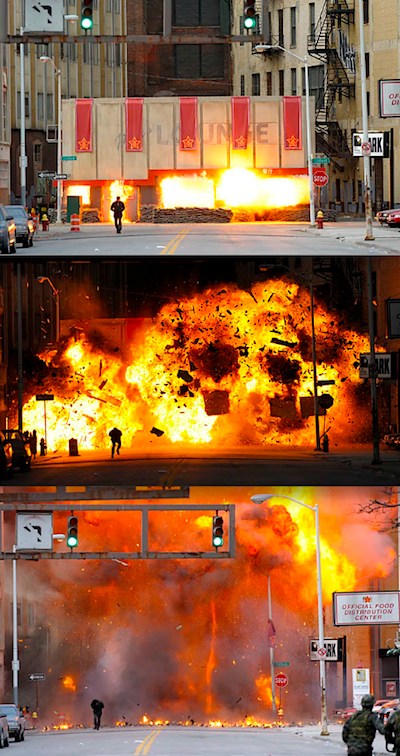
The kids regroup at the cabin, and begin to piece together what’s going on. Already there are news blackouts, and it’s not totally clear how successful the Chinese operation has been – or why it even happened. ***SPOILER WARNING*** We eventually learn that the Chinese have used advanced electromagnetic pulse weapons to disable our electronics and communications. Chinese systems are adapted to being immune to the pulse. We also learn that the Chinese are “here to collect” on the massive economic debt America owes them. ***END OF SPOILERS***
It’s at this point that Chris Hemsworth’s character, Jed, really begins to take over and assert his leadership – using skills honed during service in Iraq. He rallies and organizes the rag-tag group of teenagers under his ‘command’ – although immediately some of them don’t like him giving orders. Jed starts to chew people out and bring the hard lessons he’s learned during warfare to bear on the crisis.
What really gives the film credibility at this point – and sustains it throughout – is Chris Hemsworth playing Iraq War vet Jed Eckert. He is nothing short of sensational. If Thor doesn’t turn Hemsworth into a star, Red Dawn will. He conveys a rugged masculinity, a toughness of spirit, a middle America/Red State vibe you don’t really see anymore on-screen in the depiction of American teenage guys – all of whom have seemingly been turned into Michael Cera. Hemsworth is the glue that holds the film together.
Eventually the Chinese show up, dragging along the Eckert boys’ captured dad Tom, the town sheriff played by Brett Cullen. The Chinese military commander Captain Lo, played with icy menace by Will Yun Lee, threatens Tom – sensing that his boys are watching from somewhere out in the woods. Tom Eckert, for his part, is having none of it. He tells the boys not to give in to the Chinese, but to instead hunt them down and defeat them. (He says it a lot more picturesquely than that, actually, but Libertas tries to be a family-friendly site.)
***SPOILER WARNING*** With the kids only able to look on, helplessly, the Chinese Captain then murders their father in cold blood. ***END OF SPOILERS***
At this point, we already know everything we need to about what motivates the Eckert boys and their compatriots going forward. They’re going to fight for their home and for freedom, and they’re also going to be doing it for payback.
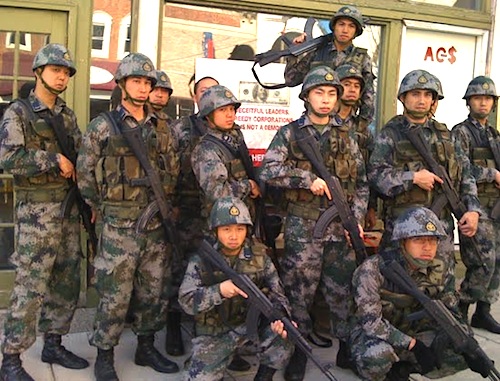
This theme of ‘fighting for your home,’ incidentally, is an important one for Red Dawn, because it serves to some extent as a source of tension between the brothers. It turns out that Matt is still angry at Jed for having enlisted in the military shortly after the death of their mother – and for remaining away so long fighting overseas. As much as war overseas has honed Jed into a formidable leader and fighter, it kept him away from his family at a crucial time. This is an important subtext of the film: specifically, that America has stretched itself too thin, and neglected to take care of its ‘home base,’ so to speak.
At this point we get a semi-obligatory sequence involving the military training of the Wolverines by Jed. This is probably the weakest link in the film. It’s difficult to imagine these teens as being adequate adversaries to the Chinese forces, in large measure because there doesn’t seem to be any way that a crash course in the woods could possibly get them prepared. In any case, we at least get to know some of the young kids a little better. Among them are Connor Cruise (Tom Cruise’s son), who plays ‘Daryl,’ and Jed’s love-interest ‘Toni’ played by Adrianne Palicki. The young cast acquits themselves honorably here.
In fact, the only problem I really had with anybody in the cast is actually with Josh Peck as Matt Eckert. Or maybe it’s just with his hair? Quarterbacks don’t wear their hair that long unless they’re Tom Brady.
But back to the story. The Wolverines head into the city to get a sense of the occupation, and to stir up trouble for the Chinese. Things are grim. The Chinese have put many Americans into internment camps, including Matt’s girlfriend Erica (played by the pretty Isabel Lucas, the robot hottie from Transformers 2) – and we learn that some Americans have even gone ‘turncoat’ and collaborated. Surprised? I wasn’t. I live in LA.

We start to get some of the film’s boffo action sequences here, as the kids race around town creating hell for the Chinese – stealing their weapons, blowing things up (there’s one especially delicious moment when a turncoat informer gets his comeuppance), and picking off the occupiers one by one. We finally get the signature moment when one of the guys – I think it’s Josh Peck – raises his machine gun from atop a rooftop and shouts: “Wolverines!” I was looking around for Charlie Sheen from the original film at this point, but he wasn’t there. (I guess nowadays he would’ve shouted: “Winning!”)
It’s important to point out here that the new Red Dawn is essentially an action picture rather than agitprop cinema. The film was directed by veteran stunt coordinator Dan Bradley, who worked on the Spider-Man and Bourne films. As a result, the film is much less philosophically or ideologically oriented than John Milius’ original film, as Bradley keeps the emphasis on action and a brisk pace.
That does not, in my opinion, make Bradley’s version the better film. In fact, I still prefer Milius’ original – which is much more ruminative, idiosyncratic and character-driven. Also: the Chinese in this new Red Dawn lack the signature hardware like the Soviet Hind helicopters from the original – making them somewhat less formidable – and we never get to know them as well as we do the Russians and the Cubans in the original.
One further note: at no point does the new Red Dawn descend to racist stereotypes. The Chinese are depicted essentially as cool-headed professionals on a mission.
The big action sequence in the middle of the film involves Matt’s ill-advised effort to rescue his girlfriend, Erica, during a rally orchestrated by the communist Chinese in the middle of town. With the Wolverines causing endless headaches for the occupation, and inspiring resistance efforts elsewhere, the Chinese decide to hold a big public spectacle in which they and their local political puppets – including the town mayor – encourage the population to co-operate. This scene has that icky, uncomfortable, Sorrow and the Pity feel that films depicting occupations always have – where nervous officials tell nervous citizens how everything will be OK if we just bow and smile to our new masters.
Ominously, a representative of the Russian Spetsnaz appears on the viewing stand, joining the Chinese brass and local officials. Uh-oh. The Chinese aren’t alone, it turns out. (Or perhaps the Russians were simply annoyed at being cut out of the remake?)
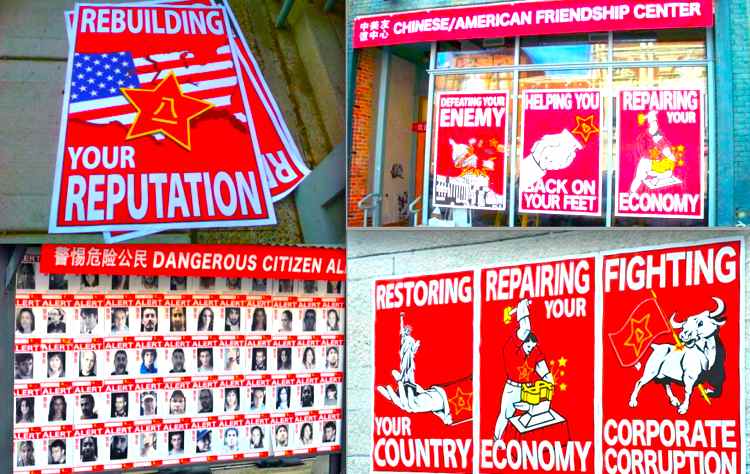
The Wolverines arrive in force to spoil the day for the Chinese, but Matt spots his cute blonde girlfriend being driven away in a prison bus. So in the midst of the Wolverines’ carefully planned guerrilla operation, he goes rogue and heads off to save her. I won’t reveal what happens, but some hard lessons end up getting learned as a result of his foolish, romantic gesture.
The Wolverines eventually run across some Marines who are looking for them. (One of them, interestingly, is himself Chinese-American.) This is a great little moment in the movie, because the Marines are really appreciative of what these half-trained kids have been doing. I must confess to finding this sequence quite touching; aside from getting ripe dialogue of the “Marines don’t die, they just go to hell and regroup” variety, you also are reminded of how mobilized, volunteer citizens can always make a difference – no matter what the cause. What else, after all, were the Tea Parties about?
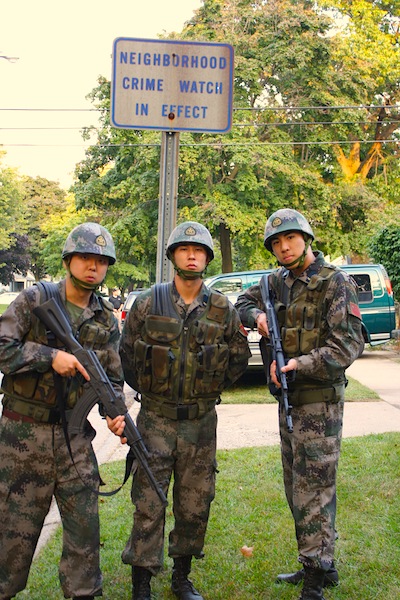
The Marines fill in the Wolverines about what’s been happening in the war. We learn about the Chinese using advanced electromagnetic weapons that knocked America’s military systems off-line, and that the West Coast folded quickly (of course!), and the East Coast, as well – except for Florida. There are also some delicious – albeit indirect – references to how resistance to the Chinese invasion seems stronger in the Red States, especially in the Heartland and in border states like Arizona and Texas. (It will be interesting to see whether these references are edited out by MGM’s new management.) And the Wolverines themselves, ironically, have been inspiring that resistance – without even knowing it.
The film then builds to its climactic action sequence as the Marines and the Wolverines mount an assault on a local police station that houses a device controlling the Chinese electromagnetic pulse weapon. This intense, gnarly action sequence – like something out of a Bond film – is easily the signature moment of the film, and is clearly where Dan Bradley shines as a director. (My favorite moment in the sequence, though, is when the Chinese-American Marine, mimicking the communist Chinese in order to distract them during the raid, chatters into a microphone: “The vicious rodents are attacking!”) The action here is 80s-old school, with blazing sub-machine guns, shattering glass, bone-crunching fights … and, eventually, payback for the Eckert boys who finally get their revenge.
The film isn’t over, however – nor is the Chinese occupation. The Spetsnaz intervene with some nasty consequences for the Wolverines, and the film concludes with the sense that the fight for America’s liberation has only just begun. Tellingly, the film ends with the Wolverines liberating an internment camp … built on the site of their own high school. The final image in the film is of the Wolverines charging into battle onto their own football field – the same one seen at the opening of the film – but now they carry an American flag, instead of school colors.
It’s a rousing conclusion – emotional and satisfying – and quite similar, actually, to the way the recent Battle: Los Angeles ends.
—
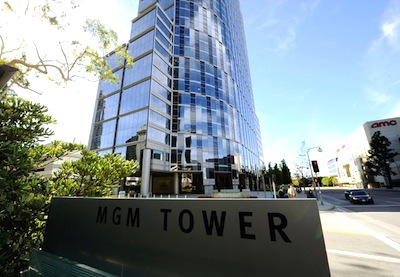
So that’s what we saw. It’s a shame that MGM is now going to tamper with it for political reasons – and turn the villains into the North Koreans, Guatemalans, Saskatchewans, or whoever else they have in mind. Hell, why not have the Oakland Raiders invade? I’d find that more believable than the starving, impoverished prison state of North Korea invading us right now.
Ironically, Red Dawn isn’t the only entertainment property coming out this year with this same basic storyline. John Milius’ own Homefront video game – which features a North Korean communist invasion of the American homeland – debuts this week. And there’s also the Australian film Tomorrow, When the War Began (based on the popular Australian novel series), which features teenagers fighting off an invasion of Australia by an unspecified Asiatic power. Tomorrow was a huge hit in Australia, a sequel is already in production, and Paramount has picked up international distribution rights to the original film.
Homefront, Tomorrow, When the War Began and the newly re-edited Red Dawn all, however, appear to be equivocating on the nature of the threat coming from China – a threat that courageous Chinese filmmakers like Zhao Liang and Huang Weikai have literally risked their lives to document. If only filmmakers in the West had their courage.
It’s important that America, and world audiences, not be deceived about the repressive, totalitarian nature of the communist regime in China. The ‘uncensored’ version of Red Dawn offers us a vivid warning about the Chinese government. We’re sorry to learn that MGM will now be participating in this general whitewashing of China’s regime, in order to preserve its corporate profits.
MGM’s profits here are coming at a very steep price for the rest of us: that of free speech.
[UPDATE: Special thanks to Lars Larson for having me on his radio show today, and also to Hot Air for linking to us. Also many thanks to our friend Patrick Goldstein of the LA Times for his article today on this piece, and also to Ted Johnson at Variety, Garth Franklin at Dark Horizons, and the folks at Indiewire/Playlist.]
[UPDATE 2: Special credit goes as well to the Red Dawn 2011 website and George Joseph for the terrific poster he designed and some of the behind the scenes photos in this story.]
Posted on March 17th, 2011 at 8:34am.
It’s truly sad how closed minded Hollywood has become. I often ask myself if certain movies that I enjoy from my youth could even be made today. Look at the atrocious remake of The Manchurian Candidate and now Red Dawn? Truth is not part of the equation. Movies are made to either promote an overt leftest agenda or sprinkle not so lightly with leftest platitudes. Then there’s just plain monstrosities like Mar’s Needs Moms. What’s worse were talking about an (movie) industry that’s over hundred years old and no one can come up with anything original. Don’t get me wrong movies as product is fine with me. Just please be competent and release a quality product.
We’re in a slump, there’s no question. But make sure to check out Battle: LA right now. Also: did you ever get around to seeing Salt? It hit DVD recently.
Saw SALT and loved it. It’s one those movies that with a lessor actor than AJ (like her first Tomb Raider movie) it probably would have sucked
Agreed.
I notice there are Chinese people posting they don’t mind the original concept of the Chinese being the enemy. Fine, that’s there prerogative.
I am also Chinese, and let me say, I am happy at this proposed change. Not because it would make for a better movie, far from it. It pleases me because it’s good to see China flex its muscles. Or it’s good to see white producers scared of offending us Chinese.
That’s a fascinating take, there, Bruce. By the way, I thought your mirror-fight in Enter the Dragon was really top notch.
DurkaDurka Boowse Wee
In mind of this bit in the review concerning the change of the Chinese villains into North Koreans: “As a further note, there is a certain racist crudeness in equating Chinese with Koreans (i.e., ‘Asians all the look the same’) of which MGM seems unmindful.” MGM was already unmindful when casting KOREAN-American actor WILL YUN LEE as the main Chinese villain. There goes that point.
Yes, well, they now seem to be compounding the problem – don’t they?
If a bankrupt company wants to get some money out of a market which consists of a billion customers, it is very understandable. As we do not know how huge the changes are to the film, we just have to wait and see. Making the villains North Korean – although for them to invade is somewhat farfetched – does not offend anyone, as absolutely nobody likes North Korea.
MGM’s move is certainly ‘understandable,’ while also being contemptible in so far as it further whitewashes the Chinese regime.
The changes to the film, by the way, are quite significant. If you don’t wish to take my word for it, read the LA Times article.
It’s only going to get worse in the real world. Too bad the “new MGM” had to tuck tail and submit to TPTB.
Time for me to quit giving MGM my time and money by watching their films.
I hear you.
Why cant MGM just release several versions of this film for different markets.
Release the film uncensored version in the US, North America,South America,Europe
and release the north korean version over in China, and other asian markets.
I dont think the folks at MGM understand how bad this selling out to China has made them
look. I for one think this new censored version will bomb at the boxoffice. C’mon MGM
show some guts, show some pride, make the LION ROAR, not roll over and wimper.
GIVE US UNCENSORED RED DAWN, GIVE CHINA THE NORTH KOREAN VERSION.
This would be a much better compromise.
I hate to resort to illegally downloading torrents, but do you think there is any possibility that someone inside MGM might release the unedited, uncensored, Chinese-villain version on the internet for those of us who want to see the movie without the whitewash?
Also do you know if MGM is considering something like Jason’s idea of just releasing different versions in different countries?
Unfortunately, I doubt at the moment that the ‘uncensored’ version will be available any time soon.
Thanks for the information all the same, much appreciated! Guess we’ll all just have to wait and see what happens.
This massive censorship campaign by MGM is beyond ironic, considering this is Red Dawn we are talking about.
If MGM follows thru with this it is a blow to all those who believe in personal freedom and human rights.
I didnt think China was that sensitive, damn its a fictional movie. Get over it. So we as americans have to have this
american film changed because of China. How stupid can MGM get. I like Jasons idea of making two versions, I cant believe no one at MGM has thought of this idea. American audience gets what it wants, China gets the redo version so no ones feelings get hurt. Cha-Ching$$$$$$ money to be made.. Red Dawn 2011 website has a poll
asking which villian would you prefer CHINA or north korea. CHINA is in the lead big time. MGM are you paying attention. I wont see this film at all if its the north korean/communist coalition version, for the simple reason that
me and my fellow americans were sold out for our communist friends in China. There is no excuse for this MGM.
Thanks for the kind word here, Larry, I appreciate it. Actually, though, I’m in favor of the ‘original’ version with communist China as the villains. I see no narrative reason to change that storyline – only venal corporate reasons.
I was very excited to see the ‘remake’ and using China as the main enemy made all the sense since this is the most likely scenario for the U.S. future. Changing the ‘enemy’ to North Korean does smack of ‘racism’ and makes no sense at all in reality because of North Korea’s stature. Since MGM is changing the movie, I”m changing my mind and am immediately a boycott of the movie and will promote watching it online for free instead by everyone outside of Communist China whom MGM seems to have more in common with than in the USA.
A very sensible reaction on your part, Brian.
Was the soundtrack and or score anywhere near as good as the 1984 version.
“Changes WILL NOT eliminate all references to China though will give north korea a much larger role in the coalition that invades the US.”
So China will still be part of the coalition that invades along with the Russians and now the north koreans. Its just being changed up to portray the north koreans doing more of the dirty work. Makes sense, although Im not in favor of these changes, this film could still work, the key is how much of the Chinese will still be referenced and or portrayed. That will determine how much of a credibility factor the changes will have, which in turn will affect the boxoffice numbers. It sounds as if the north koreans will be to this remake what the cubans were to the soviets in the original. But again it will hinge on how much of the chinese role in the invading coalition is censored. And considering that both the West and East coast are invaded, I cant see how the Chinese cannot be involved. All of this will also contribute to how well the overall plot is affected. It will be interesting, I hope that MGM/Tripp Vinson will clarify this whole mess and soon. If the coalition is China,Russia and n.korea then the film will draw more to the theaters, but if China is not involved at all, well again the whole credibility aspect is shot down in flames.
Derek, thanks for your comments.
Whether the film may still be ‘good’ after the cuts is not the issue to me here. This is a free speech issue. The issue is that MGM is re-editing its film in order not to offend the communist Chinese – not in order to make the film better. And were it not for Libertas and the LA Times, they would currently be doing all this in the dark – i.e., without anyone knowing about it.